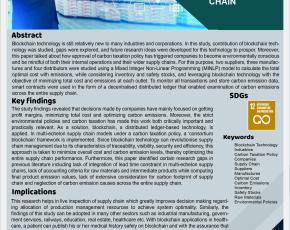Abstract
Blockchain technology is still relatively new to many industries and corporations. In this study, contribution of blockchain technology was studied, gaps were explored, and future research ideas were developed for this technology to prosper. Moreover, this paper talked about how approval of carbon taxation policy has triggered companies to become environmentally conscious and be mindful of both their internal operations and their wider supply chains. For this purpose, two suppliers, three manufactures and four distributors were studied using a Mixed Integer Non-Linear Programming (MINLP) model to calculate the total optimal cost with emissions, while considering inventory and safety stocks, and leveraging blockchain technology with the objective of minimizing total cost and emissions at each outlet. To monitor all transactions and store carbon emission data, smart contracts were used in the form of a decentralised distributed ledger that enabled examination of carbon emissions across the entire supply chain.
Key findings
The study findings revealed that decisions made by companies have mainly focused on getting profit margins, minimizing total cost and optimizing carbon emissions. Moreover, the strict environmental policies and carbon taxation has made this work both critically important and practically relevant. As a solution, blockchain, a distributed ledger-based technology, is applied. In multi-echelon supply chain models under a carbon taxation policy, a ‘consortium blockchain’ framework is implemented. Since blockchain technology can revolutionise supply chain management due to its characteristics of traceability, visibility, security and efficiency, this approach is taken to minimize overall cost and carbon emission levels, thereby optimizing the entire supply chain performance. Furthermore, this paper identified certain research gaps in previous literature including lack of integration of lead time constraint in multi-echelon supply chains, lack of accounting criteria for raw materials and intermediate products while computing final product emission values, lack of extensive consideration for carbon footprint of supply chain and neglection of carbon emission causes across the entire supply chain.
Implications
This research helps in live inspection of supply chain which greatly improves decision making regarding allocation of production management resources to achieve system optimality. Similarly, the findings of this study can be adopted in many other sectors such as industrial manufacturing, government services, railways, education, real estate, healthcare etc. With blockchain applications in healthcare, a patient can publish his or her medical history safely on blockchain and with the assurance that only an authorised person can access it from anywhere. In this manner, a blockchain of citizen health records can be established and maintained. Similarly, the traceability aspect of blockchain can allow us to track pharmaceuticals throughout the supply chain, ensuring the genuineness of those pharmaceuticals. The application of blockchain technology in a vast area of fields makes it a valuable solution for most real-time everyday problems. However, in order to implement it, organizations and mangers need to be confident about this technology otherwise it will face resistance. One way is to practically show how blockchain technology can solve a firm’s problems through models and applications.













